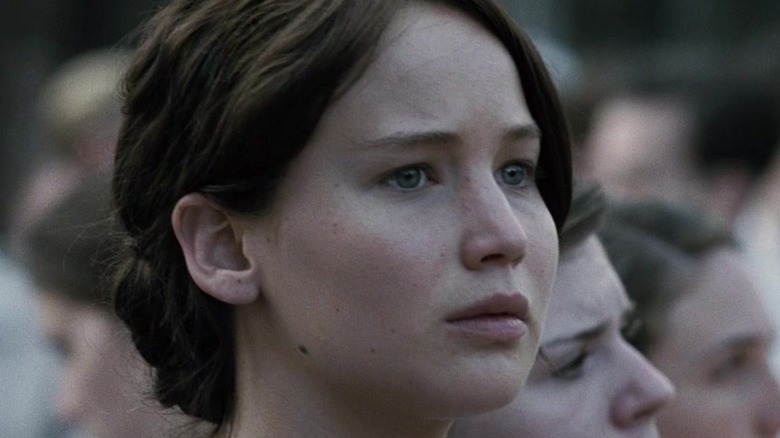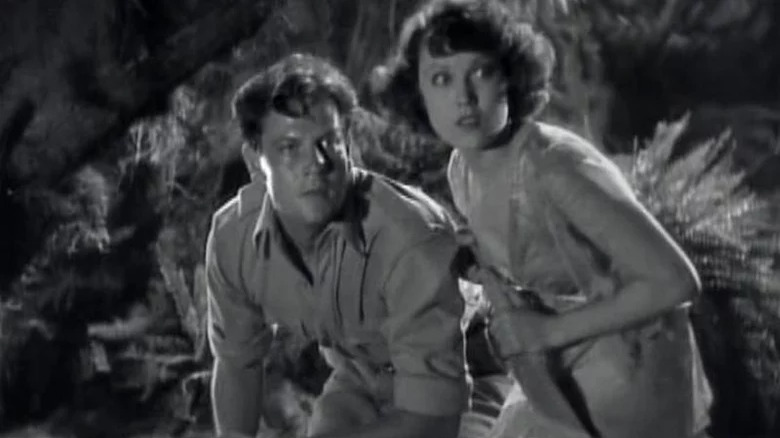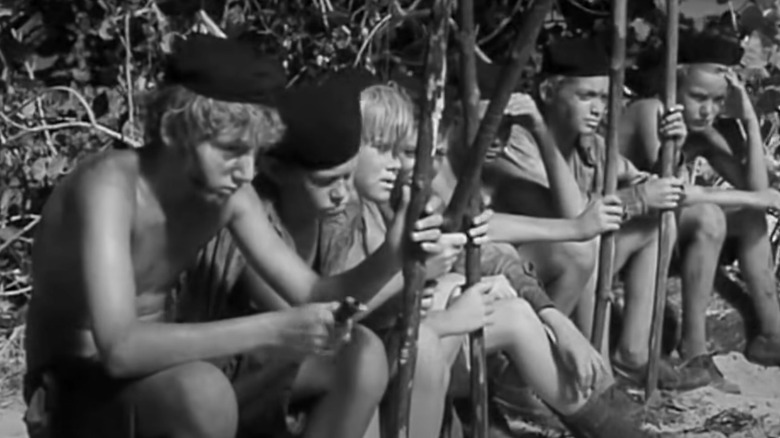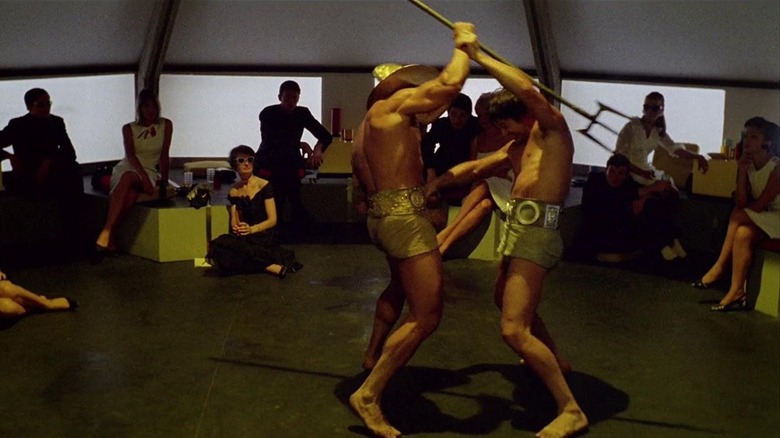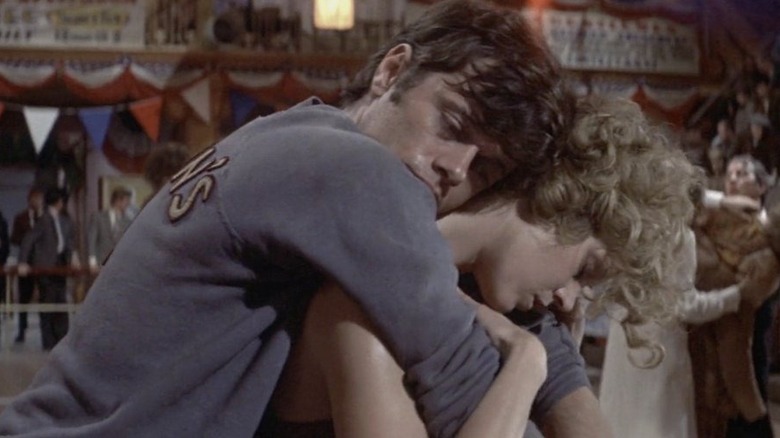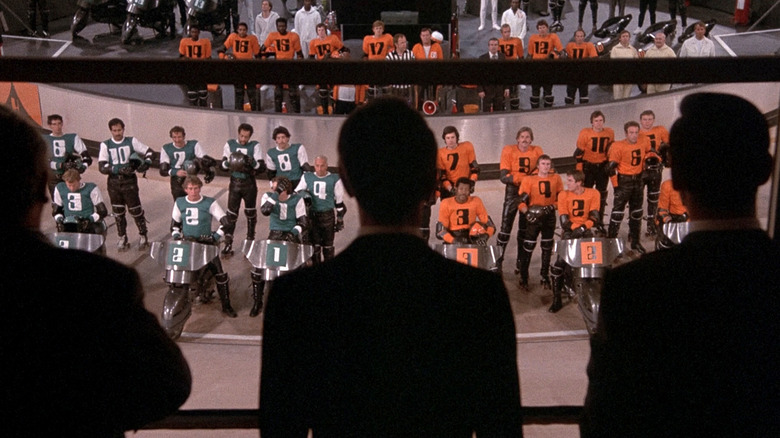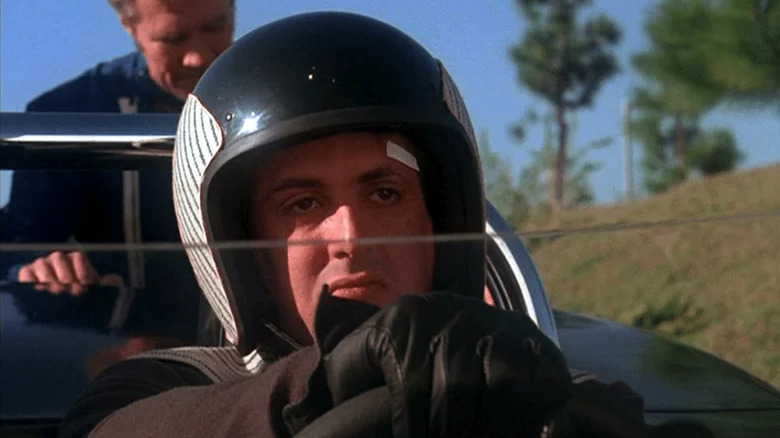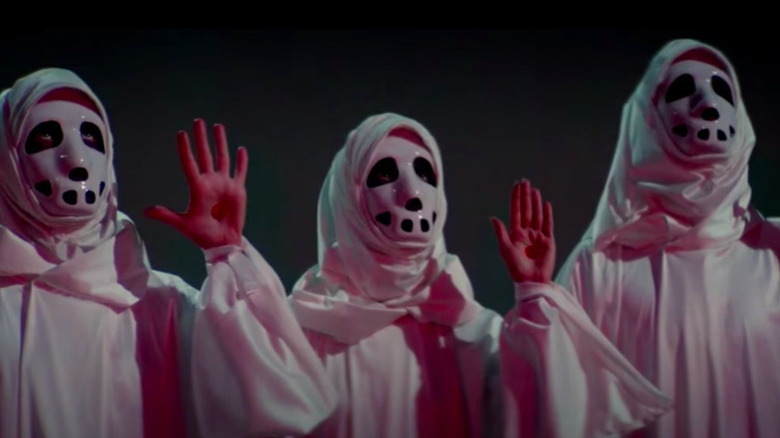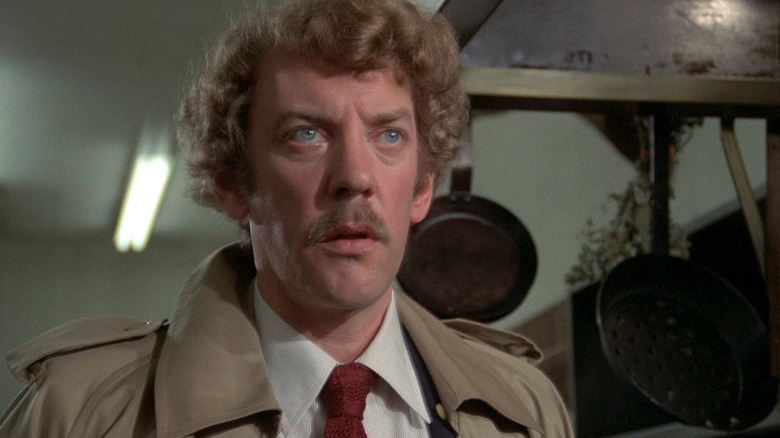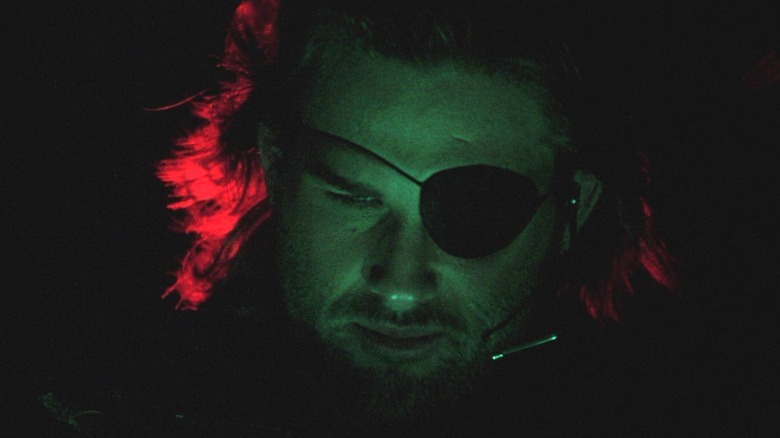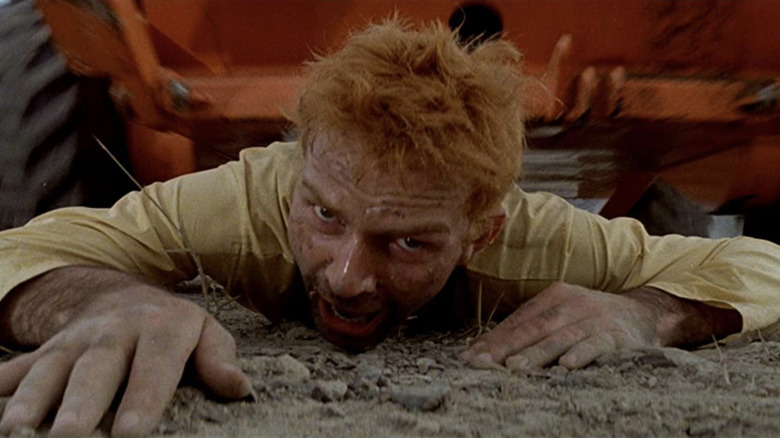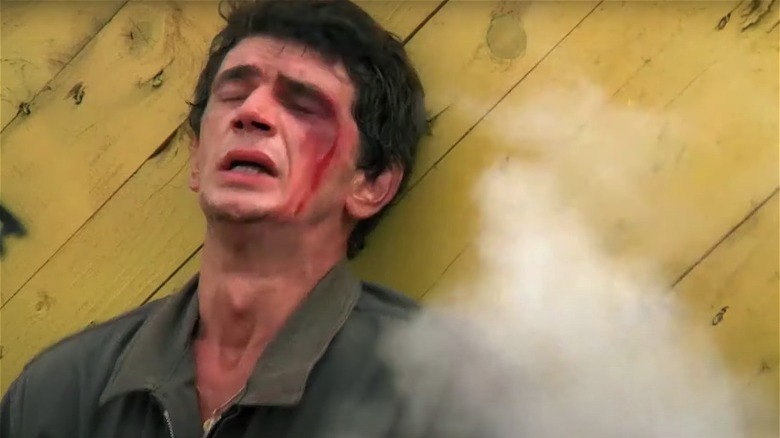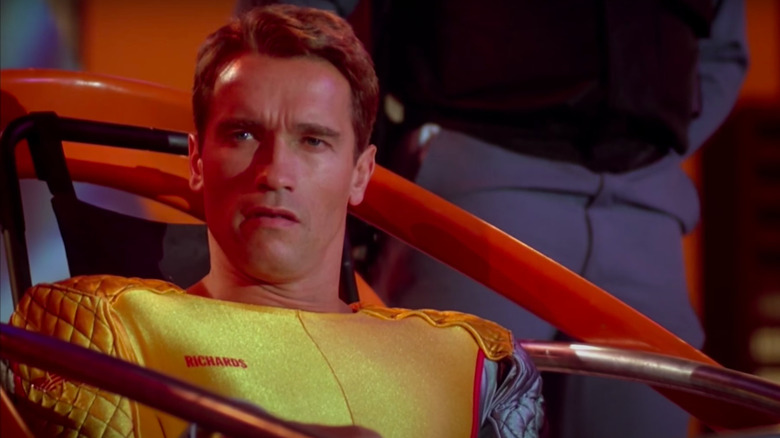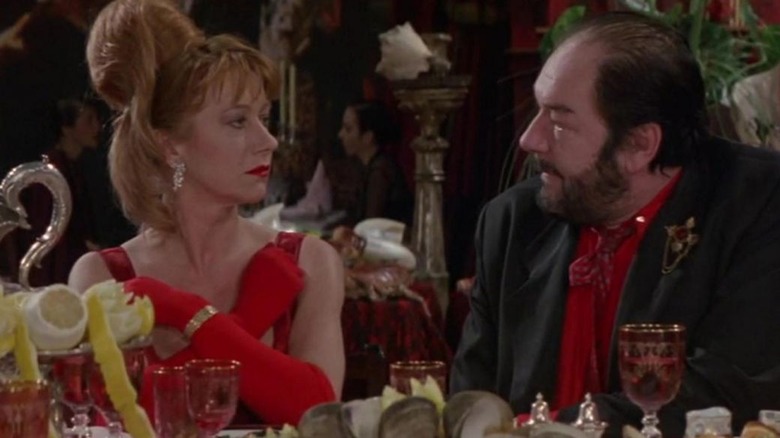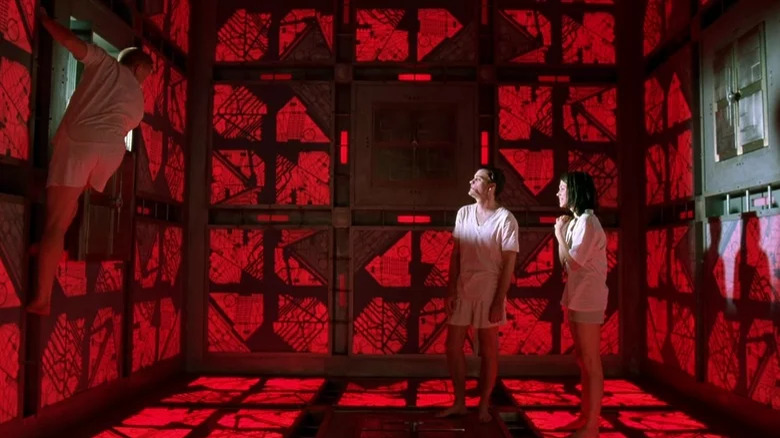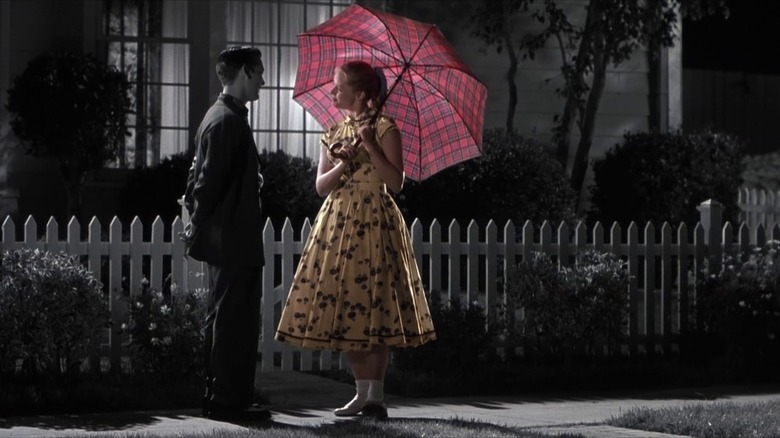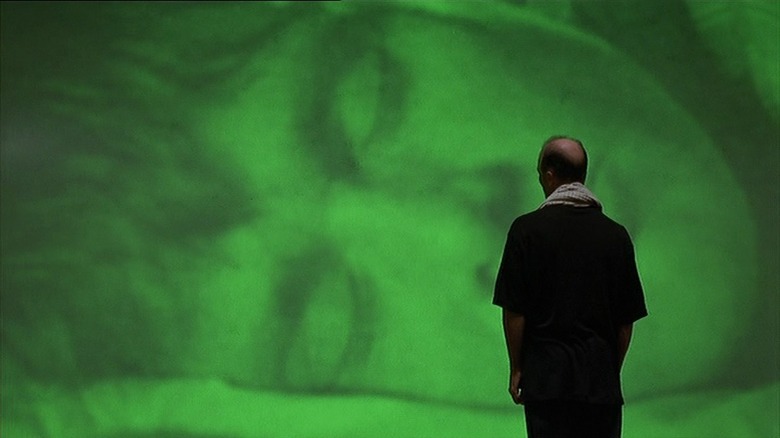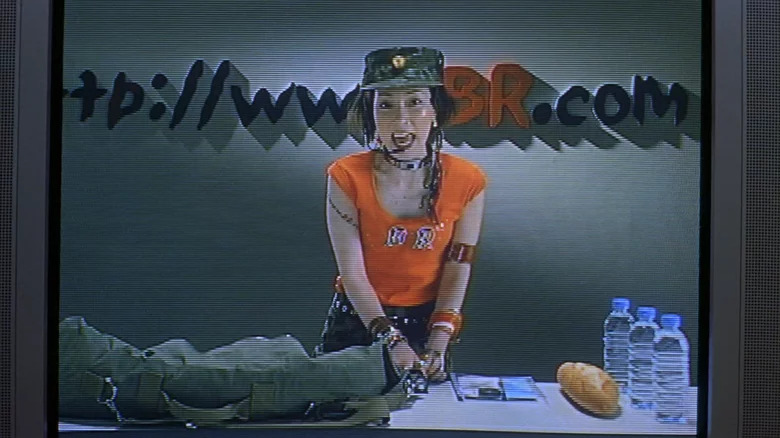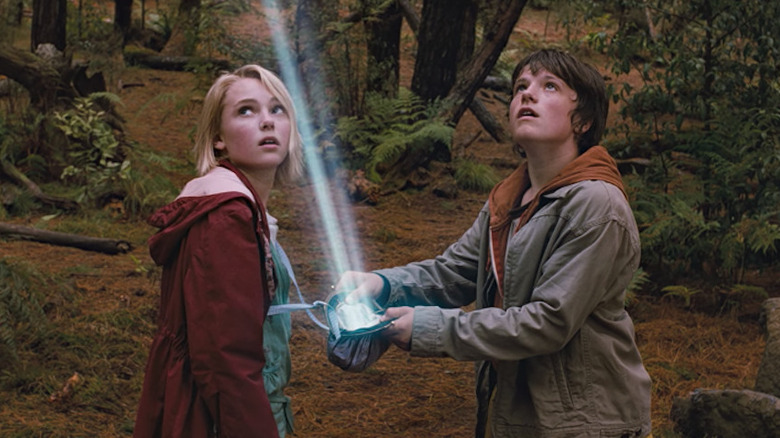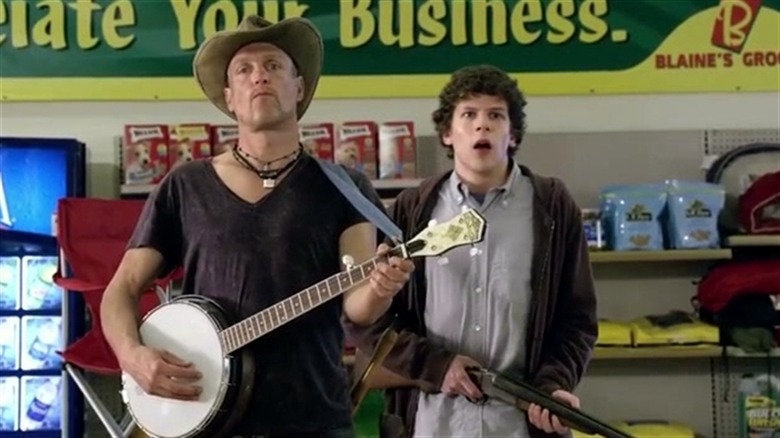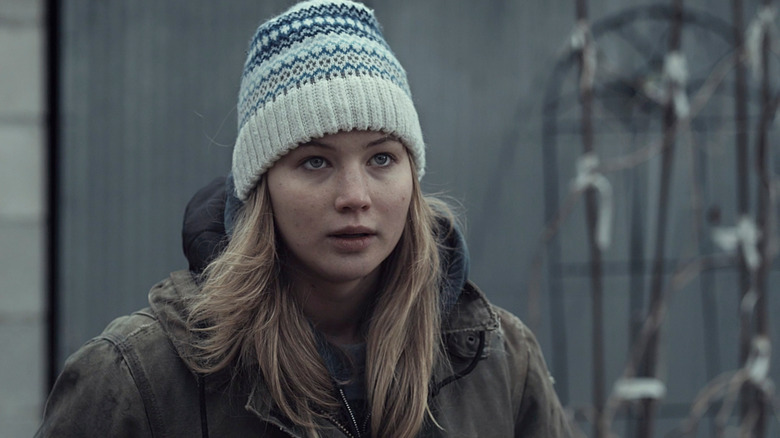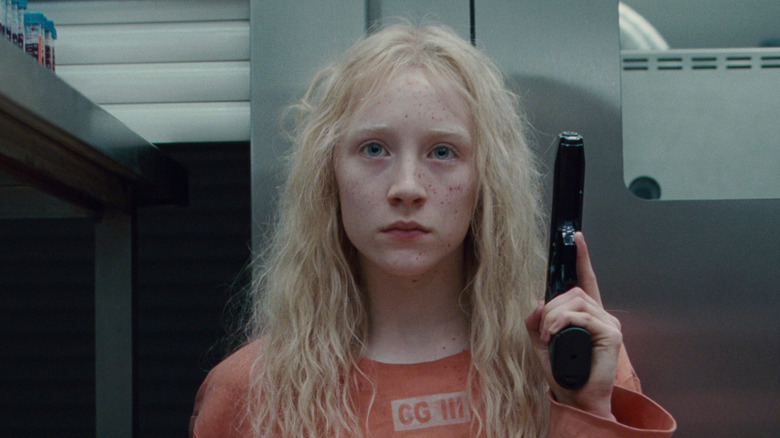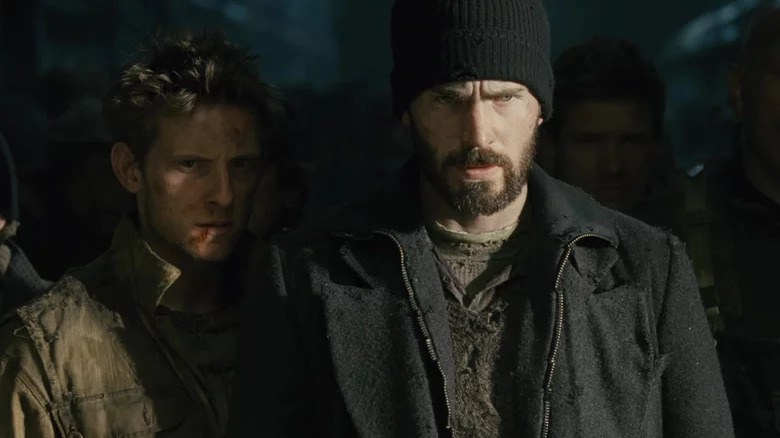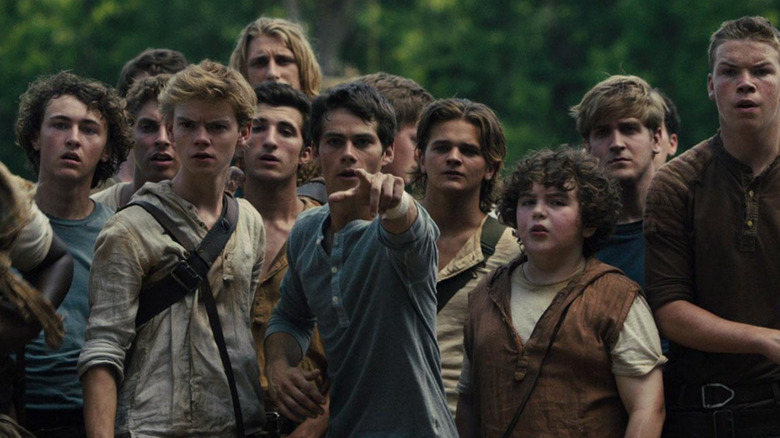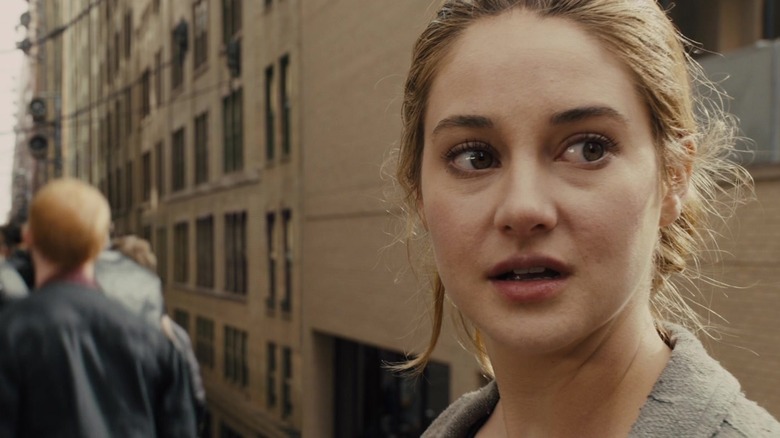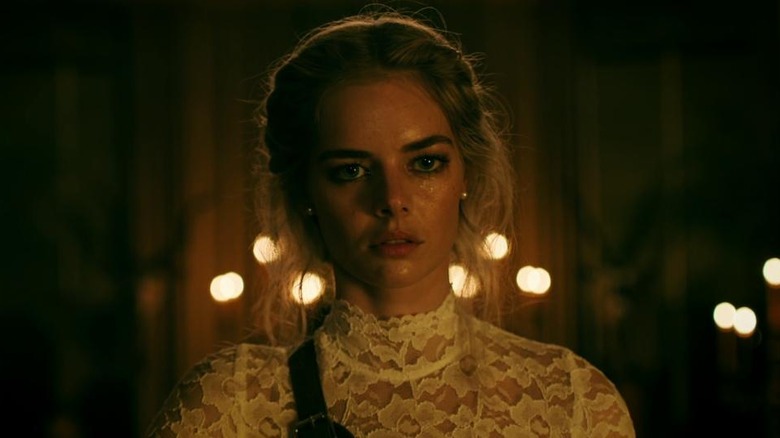25 Movies Like The Hunger Games You Should Watch Next
The first entry in a franchise that ultimately spanned four films, "The Hunger Games" first introduced Suzanne Collins' series to the big screen in 2012. Showing off Jennifer Lawrence's undeniable screen presence and earnest arrival into the blockbuster space, "The Hunger Games" also acted as a firm benchmark for many adaptations of young adult sci-fi fiction to come.
The film takes place in a dystopian vision of North America, now known as Panem. Every year, the Capitol district puts the twelve subjugated districts in their place with a bloody and cynical piece of propaganda: the Hunger Games, a compulsory death match that pits randomly selected youngsters from each district against one another in a fight to the death. It is, as we're reminded by the Capitol's many mouthpieces, a symbol of the Capitol's enduring dominance in the wake of a failed revolt nearly a century ago. It is a brazen and garish show of power, televised across the continent where the life-and-death bloodbath is consumed like a reality show.
When the Capitol's representatives roll into District 12, Katniss (Jennifer Lawrence) assures her younger sister Primrose that she will not be selected. When the young, terrified child is indeed chosen, Katniss volunteers as tribute in her place. Accompanied by fellow lamb-for-slaughter Peeta (Josh Hutcherson), Katniss struggles to balance her need for survival with her refusal to be another cog in the Capitol's machine.
If you love "The Hunger Games," you've come to the right place. Below you'll find 25 films that either play in a similar genre space, have similar set-ups, enjoy a shared cast, or otherwise possess some uncanny resonance.
The Most Dangerous Game
Arguably the cinematic precedent to a good portion of the films on this list (as well as "The Hunger Games" itself), don't let the age of "The Most Dangerous Game" fool you. At nearly a century old, Ernest B. Schoedsack and Irving Pichel's infamous horror-thriller retains much of its original bite.
A chilling adaptation of Richard Connell's short story of the same name, the 1932 film sees the survivors of a shipwreck (Fay Wray and Joel McCrea) as the hapless guests of the eccentric Count Zaroff (Leslie Banks), a reclusive big-game hunter with a taste for cunning and challenging prey. Namely: other people. A haunting, economically paced, and undeniably influential horror-thriller, "The Most Dangerous Game" is much, much more than a historical curio. If you want to see the precedent for the human horror hunt of "The Hunger Games," check out this oldie (but a goodie) to witness the nightmare that started it all.
Lord of the Flies
If you're wondering where pop culture initially got its barbs in the whole "children versus children" gambit, look no further than Peter Brook's 1963 film about a gaggle of shipwrecked British schoolboys. With no adults left in the wreckage of their plane crash, the youngsters are forced to suss out how to survive on their new island home. Told primarily from the perspective of the level-headed Ralph (James Aubrey), the kids' fragile society quickly goes off the rails as hunger deepens, tempers mount, and egos clash.
While "The Hunger Games" is more interested in teasing out the ways in which adults use children as weapons, "Lord of the Flies" uses its frightening youngsters as a rich ground for commentary on the dark, selfish nature of the human condition itself. Civility and social graces are paper-thin, it turns out. Even the most innocent among us are a hair's breadth away from anarchic madness.
The 10th Victim
If a self-professed utopian society brags that it has eradicated the need for war by instituting a televised murder show, maybe (and hear us out with this one), you don't actually have a utopia on your hands. "The Hunger Games" has the titular Hunger Games and Elio Petri's 1965 genre film "The 10th Victim " has the Big Hunt.
In the far-flung future of the 21st Century, violent individuals are given the opportunity to get their urge to kill out of their system by participating in a reality show where contestants attempt to murder one another over ten rounds. But competitors aren't just trying to satisfy their murderous kicks. There's fame and fortune on the line too. Once a killer scores their tenth victim, riches and social boons are theirs for the reaping. Seasoned killer Caroline Meredith (Ursula Andress) has just claimed her ninth soul and the only thing that stands between her and fame and glory is a blossoming love affair between the seasoned killer and her would-be victim.
They Shoot Horses, Don't They?
While mass spectacles pitting man against man are peppered throughout human history, sometimes it's the smaller, more intimate tales of bloodsport that are just as liable to send shivers up your spine. Released in 1969, Sydney Pollack's harrowing masterpiece centers around a dance marathon, a competitive "go till you drop" contest geared towards exploiting the poor and destitute during the Great Depression. It's entertaining to watch people literally dance themselves to death right? Right?
With the life-saving promise of a $1,500 cash prize dangling just out of reach, contestants participate in an increasingly hectic nonstop dance party as a manipulative MC (Gig Young) pushes them to (and beyond) their breaking points. A deeply dark and heartbreaking portrait of the literal games capitalists are willing to play with the lives of the desperate, "They Shoot Horses, Don't They?" continues to be horrifyingly prescient and timely despite its firm and macabre rooting in an all-too real time and place in American history.
Rollerball
There were a number of dystopian sci-fi films released in the 1970s centered around violent entertainment meant to placate the masses. But none are as brutal (and as plausible) as "Rollerball." Directed by Norman Jewison (perhaps best known for romantic comedies like "Moonstruck" and big-budget musicals like "Fiddler on the Roof"), "Rollerball" takes place in a future ruled by corporations (who could imagine such a thing?). Our hero Jonathan (James Caan), is a star player in the ultra-violent contact sport Rollerball, which is what you get when you mix roller derby, hockey, and MMA. It's as cool and brutal as it sounds.
While Jonathan brings glory to his Houston team, the powers that be do their best to "retire" Jonathan from the sport, having grown nervous about the public sway the superstar wields. Digging into his bankroller's sticky histories and doing his best not to lose his life on the rink, much like Katniss, Jonathan finds himself at the center of a revolutionary tide.
Death Race 2000
Don't let that hilarious exploitation era title fool you. "Death Race 2000" is a searingly incisive entry in the "our dystopia has organized sports" film canon. After the world falls to pieces leaving civil and economic chaos in its wake, the world has cobbled itself back together under tyrannical rule. And what is tyrannical rule without vehicular bloodsport?
In the year 2000, five racers (and their co-pilots) steel themselves for the 20th annual Transcontinental Road Race, a cross-country contest orchestrated to pacify the unruly population's lust for car-nage. The goal is this: the drivers will cross the continent in souped-up death machines as fast as possible, killing whoever is foolish to get in their way for bonus points. Each driver has their own pro-wrestling-esque persona. And our hero, bless him, is the gimp-suit-wearing Frankenstein (David Carradine), a national hero who aims to use the race as an opportunity to assassinate Mr. President, the oligarch of America. A fan-favorite of a deadly game weaponizing their fame to topple governments and unite the people? Sounds delightfully familiar to us.
Logan's Run
In many ways, the first "Hunger Games" film is the story of someone being thrust into the position of a revolutionary. While Katniss' life in District 12 was full of heartache, not even the dream of running away with Gale could sway her to abandon her home and her family. It was only when the powers that be forced her up against a wall that she began to toy with seditious thoughts. The same is true for Logan (Michael York), whose trust in the state becomes compromised when he becomes the target of their draconian rule of law.
The year is 2274, and humanity (or what's left of it) now lives inside a massive geodesic dome that separates them from the outside world. To contain the population and maintain a semblance of order, all citizens are forced to undergo a pseudo-religious rite when they turn 30 that promises a chance at rebirth — that in fact kills all participants. Logan works as a Sandman, a hunter who tracks down individuals who attempt to flee once their time is up. Then, when Logan is forced to become a Runner himself after inquiring after a fabled "sanctuary," he and another citizen must escape the city together to see for themselves what's on the outside.
Invasion of the Body Snatchers
We'd like to think of Donald Sutherland's turn as the imposing President Snow, the sinister head honcho behind Panem, as a gateway drug of sorts. Even if your first exposure to Sutherland was through "The Hunger Games," we'd bet you could sense his undeniable presence on camera. Well, the good news is you have veritable decades of top-tier Sutherland content to sift through.
Among the actor's exhaustive catalog of bangers, not much can compare to 1978's "Invasion of the Body Snatchers." A distinctly barbed and menacing remake of Don Siegel's Cold War paranoiac nightmare from 1956, director Philip Kaufman infuses his take on an insidious alien invasion with a skin-crawling sense of body horror, political unease, and identity theft. While humanity has long expected metal ships as harbingers of visitors from outer space, we were not ready for organic spores; for a plant-like hive-mind dead set on stealing our likenesses and taking our place on this planet, as though nothing had happened. A conspiracy horror-thriller grounded in Sutherland's frantic performance, "Invasion of the Body Snatchers" is a hopeless and enthralling take on the apocalyptic horrors that await us throughout the galaxy.
Escape From New York
If your favorite part about "The Hunger Games" is the audacity of the government's decision-making with respect to controlling the masses, you're spoiled for choice as far as movie dystopias are concerned. That said, it doesn't get much more audacious than: "What if we turned all of Manhattan into one, massive prison?"
The second collaboration between former Disney star Kurt Russell and genre heavyweight John Carpenter, "Escape From New York" is set in the far-flung future of 1997. Manhattan is no more. In its place there stands a massive, maximum-security prison; a walled holding pen for all of the United States' miscreants. It is simultaneously the tenth circle of hell and an anarchist's paradise; a city-sized penal colony where residents are left to cannibalize one another and rot indefinitely. It is, in other words, not the place you'd want the US President (Donald Pleasence) to wind up after his plane was hijacked. Oh, and to make matters worse, the commander in chief was en route to defuse a potentially world-ending nuclear war.
With the clock ticking, the powers that be are forced to turn to an unlikely ally: tight-lipped (and tighter pants'd) convict Snake Plissken (Russell). Acting as their man on the inside, it's up to Snake to evade Manhattan's various gangs and rescue the President before it's too late.
Turkey Shoot
Wish that "The Hunger Games" had some down-under flair? With a generous side-helping of exploitation sleaze? Well, fear not, the fine folks from the land of Oz have you covered.
We have a couple of films on this list that fall into the "hunting human beings for sport" zone. But none have as evocative a title as 1982's "Turkey Shoot." Directed by prolific b-movie legend Brian Trenchard-Smith, "Turkey Shoot" takes us into the horrific dystopian future of the year 2000, where what's left of humanity is rounded up into "re-education" camps where they're tortured and assaulted by sadistic, corrupt prison guards. One of their more depraved games is the titular "Turkey Shoot," a manhunt that promises freedom for survivors and horrific death for everyone else. An essential notch in the Ozploitation canon, "Turkey Shoot" is gory, unsubtle, sci-fi action fun. All that cannibalism and Orwellian fascism would be mighty disturbing if it weren't so cartoonishly ludicrous. Strap in for a good time!
The Prize of Peril
Based on Robert Sheckley's seminal mid-century short story of the same name, "The Prize of Peril" is sure to scratch your itch for more films centered around nefarious, deadly game shows that prey upon the oppressed. A prescient vision of "last man standing" reality shows, "The Prize of Peril" was adapted in 1983 as a French-Yugoslav co-production. While not the first adaptation of Sheckley's work (that honor goes to the 1970 West German TV Movie "Das Millionenspiel"), the 1983 film boasts a certain je-ne-sais-quoi in the form of Gérard Lanvin's charismatic performance that puts it on top.
Set in a futuristic society that has decided to calm public unrest with voluntary gladiatorial games, members of the public are encouraged to fight to the death for cash prizes while the bloodbath is aired on live television. Oh, and did we mention that no one has ever won the game show? Nothing suspicious about that, right? Steeped in a distinctly European grit and grime and full of genuinely engaging action set pieces, if you can find it, we wholeheartedly suggest seeking out this criminally under-seen gem.
The Running Man
We're not going to argue that "The Running Man" plagiarized "The Prize of Peril," But truth be told if you're anything like us, the more murder-tainment dystopian movies the merrier. Based on the Stephen King novel of the same name, "The Running Man" takes place in a future where American society has deteriorated into a police state. All cultural content has been censored with one exception: a game show in which convicted cons fight for their lives — literally.
As its name suggests, the Running Man sees criminals egged on by the promise of freedom hunted and stalked by ruthless killers, armed to the gills and gleeful at the prospect of mowing down guilty criminals. After an escape attempt gone wrong, Ben Richards (Arnold Schwarzenegger), a cop framed for a massacre, is pressured to sign up for the Running Man in exchange for the lives of his fellow escapees.
The Cook, the Thief, His Wife & Her Lover
If you have any familiarity with outlandish British director Peter Greenaway, you may be wondering what the heck his 1989 masterpiece is doing on this list. While, in addition to star Helen Mirren (the titular "Wife") and Jennifer Lawrence essentially being twins, the connective tissue is there! You just need to be a bit of a freak (armed with an especially strong stomach) to unravel the musculature binding these two films together. A mouthful in more ways than one, "The Cook, the Thief, His Wife & Her Lover" takes place in an ambiguous dystopia where abusive crime lords rule the streets with chubby iron fists. Taking place almost entirely within a fine-dining establishment owned by pompous criminal Albert Spica (Michael Gambon, the "Thief"), Greenaway's film follows the highs, lows, and redemptive thrust of his wife's (Mirren) love affair with another diner, a humble bookkeeper (Alan Howard).
Armed with a maximalist approach to depicting corruption and style (Effie Trinket would fit right in at Spica's dining table), "The Cook, The Thief, His Wife & Her Lover" is vehemently interested in the games and machinations of cruel, powerful men. And, much like "The Hunger Games," Greenaway's film is ultimately concerned with the sacrifices necessary to overthrow such systems. So, if you're a fan of "The Hunger Games" and you're amenable to the weirder side of art-house offerings, consider dipping your toe in this very strange, seductive, and stomach-churning pool.
Cube
While "The Hunger Games" aren't a prison, per se, we've argued that the film's gladiatorial conceit shares a lot of cross-over with plenty of twisted cinematic penal nightmares. And few genre jails are as sadistic as that of 1997's "Cube," a Canadian cult classic directed by Vincenzo Natali. The film sees a group of strangers (each named after infamous prisons), trapped inside a horrifying maze-like structure. Forced to work together, the gang do their best to stave off hunger, thirst, and madness as they pool what's left of their mental resources to find a way out.
Bleak, dystopian, and headier than most of the other genre films playing in this prison-as-deathtrap space, "Cube" (much like "The Hunger Games") winds up being less about negotiating the deadly traps so much as leaning on human relationships and empathy to make it out of the Cube in one piece. Claustrophobic and suffocating, "Cube" is a compelling character study grounded around a nightmare inducing premise. Imagine "Saw," but with way more math and you're not too far off.
Pleasantville
If you're fine with deviating off the cinematic path of "kill or be killed" dystopias, consider diving deeper into "The Hunger Games" director Gary Ross' filmography. The American director has a number of comedies ("Big") and historical dramas ("Seabiscuit"). But other than "The Hunger Games," Ross' true claim to fame is the 1998 dramedy "Pleasantville." Only, now that we're thinking about it, "Pleasantville" is a dystopia in its own way.
After teen siblings, David (Tobey Maguire) and Jennifer (Reese Witherspoon) are transported from the late 1990s into a 1950s TV sitcom, their rebellious modern attitudes slowly begin to (literally) bring color into the dreadfully boring black-and-white spirit of the town. While the film's overarching Otherness metaphor including words like "the coloreds" is a little suspicious (especially given the film doesn't star a single Black person), the film remains charmingly silly and visually compelling as a knowingly on-the-nose diatribe against conformity.
The Truman Show
That's right, believe it or not, we do have a film on this list that doesn't involve murder. But, to the credit of "The Truman Show," the lack of state-sanctioned gladiatorial games doesn't make things any less insidious. Truman Burbank's (Jim Carrey) whole life has been televised without his knowledge. He is the unwitting star of a 24-hour live stream that documents his every move, unaware that his idyllic small town is, in fact, a highly curated film set.
But when cracks and seams begin to give the grand illusion away, Truman begins to dismantle the layers of performance and control that dominate his life. So yes, while the premise of "The Hunger Games" is indeed terrifying, at least those kids knew (generally speaking) what they were going into. Imagine being launched into a propaganda death match, where your overseers can start forest fires and unleash the hounds, and not have a clue what was going on.
Battle Royale
We're pretty sure there's a law against not mentioning "Battle Royale" when discussing films to watch if you enjoyed "The Hunger Games." Released in the year 2000 (and based on Koushun Takami's extremely good 1999 novel of the same name), "Battle Royale" is the clearest genetic predecessor to "The Hunger Games," and a cult classic that deserves a spot on every "underage gladiatorial games" watchlist.
Set in the not too distant future, Kinji Fukasaku's film tells of a totalitarian government's whacky decision to crack down on teen delinquents by forcing random classes of ninth graders to massacre one another until a sole victor/survivor emerges. The film follows one such class, who are abducted to an island, outfitted with exploding collars, and armed with an assortment of weapons ranging from grenades to pot lids. Boasting satire you can cut with a butter knife and outlandish violence to satisfy the genre film gorehound within us all, "Battle Royale" is the high watermark of cinematic state-sponsored killing competitions.
Bridge to Terabithia
Until now, we haven't really touched upon any tried and true Young Adult content, but so what? It's not our fault that "The Hunger Games" has so much in common with a veritable bucketload of exploitation cinema gems. But, in the interest of balancing the scales, we're here to point you in the direction of the film that put Peeta actor Josh Hutcherson on our collective radar: 2007's "Bridge to Terabithia."
Adapting the best-selling novel of the same name, Gábor Csupó's infamously heart-wrenching fantasy film follows Jesse Aarons (Hutcherson) a young boy who befriends a new girl named Leslie (AnnaSophia Robb) at the start of the school year. Together, they use their combined imaginations to create a fantasy land in the woods where they simultaneously escape and work through their real-life problems.
Zombieland
What is a zombie apocalypse if not one big global Hunger Games? If anything, the undead's rumbling, flesh-hungry stomachs make the moniker a lot more accurate, but who are we to split hairs (or skulls?). Ruben Fleischer's 2009 coming-of-age horror film sees the young Columbus (Jesse Eisenberg) teaming up with the hard-edged Tallahassee (Woody Harrelson). The pair's perfectly calibrated balance of Tallahassee's fearless rage and Columbus' tempered risk-aversion has kept the two of them alive. But when two more survivors, a sisterly duo, join up with them, their delicate give and take is thrown out of whack, forcing both of them outside of their respective comfort zones.
If you enjoyed Harrelson's fatherly turn as Katniss' mentor Haymitch Abernathy, "Zombieland" is a one-way ticket to recapturing some of that magic (albeit, with a lot less depressed binge-drinking and a lot more banjo-playing and Twinkie adulation).
Winter's Bone
If you came to this list looking for more films that can let you bask in the glow of Jennifer Lawrence's early career, you've come to the right place. Directed by Debra Granik (who readers may also know for 2018's "Leave No Trace," starring Thomasin McKenzie), "Winter's Bone" was arguably the film that thrust J-Law into the spotlight. Released in 2010, "Winter's Bone" follows teenage Ree Dolly's (Lawrence) efforts to locate her father, who disappears after posting bail with their family home.
Facing homelessness unless she can piece together the truth, Ree sets about cutting through family tensions and white lies to unpack the chaos left in her father's wake. An early example of the neo-Western craze that gripped the 2010s, "Winter's Bone" is as good as it is in large part thanks to Lawrence's Academy Award-nominated performance.
Hanna
Directed by Joe Wright (best-known for period dramas like "Pride & Prejudice" and "Atonement"), "Hanna" will certainly be up your alley if deadly young women taking down corrupt systems is your bread and butter. Since she was a child, Hanna (Saoirse Ronan) has been raised to hunt, kill, and survive. She and her ex-CIA father (Eric Bana) have turned their rural home into a training ground. Head swirling with questions regarding her ultimate purpose and inhumane abilities, Hanna is tasked with eliminating the CIA bigwig (Cate Blanchett) who wants her father dead.
A conspiracy-rich revenge thriller thick with style and featuring an incredible original score by The Chemical Brothers, "Hanna" would make for an exquisite double bill with "The Hunger Games." If the idea of "survivalist teen girls with bows" tickles your fancy, shoot "Hanna" straight to the top of your watchlist.
Snowpiercer
Dystopian fiction is, and has always been, a creative way to engage with what ails society, from economic injustice to pollution, to our bloodthirsty desire for entertainment at others' expense. Bong Joon-ho's 2013 film "Snowpiercer" is no different, leveraging the outlandish trappings of action sci-fi to make astute points about man's inhumanity to man (and to the planet).
The year is 2031, and humanity's attempts to stave off a global climate crisis have, uh, backfired. In a last-ditch effort to reverse the harm we've done to our planet, mankind shot itself in the proverbial foot and plunged the Earth into eternal winter. Luckily (depending on how you look at it) what's left of the human race managed to survive the snowy hellscape by moving aboard a Noah's Ark-like train that perpetually encircles the world. But, as the years drag on, a brutal class system emerges: with the poor and destitute regulated to the train's back-most cars and the elite, wealthy, and socially privileged laughing it up in the front. An uprising was imminent. Led by Curtis (Chris Evans), a stern man with a murky past, a small contingent from the back of the train attempts to fight their way to the front.
The Maze Runner
Finally, another film to scratch that dystopian Y.A. book adaptation itch. Based on James Dashner's 2009 novel of the same name, "The Maze Runner" sees Thomas (Dylan O'Brien), a teen who wakes up to find himself in a slap-dash community of young boys. With no memory of his former life, Thomas learns that he has been deposited inside a massive deadly maze that will require them to work together if they have any desire to survive — and to solve the mystery of why they have been trapped in the maze to begin with, as well as who, exactly, did the trapping.
"The Maze Runner" is what you get when you put "The Lord of the Flies" in a blender with "The Running Man," which honestly, is right up our alley as fans of "The Hunger Games." Taken in the context of its roots within exploitation cinema, "The Maze Runner" is a thoroughly enjoyable popcorn film that'd make for a mighty fine follow-up after watching Katniss stick it to the Capitol.
Divergent
Ah, another film adaptation of a popular Y.A. property. Directed by Neil Burger, 2014's "Divergent" is the first entry in the three-film franchise about a dystopia where a self-important aptitude-measuring personality test is used to segregate the world into four different groups. Our feisty teen heroine Tris (Shailene Woodley) learns that she's not like other girls (or anyone else, really), when she's classified as a Divergent.
Surprising no one, the dystopia formed around separating humanity into neat little groups wants to kill all outliers. Once she learns of the conspiracy to exterminate all Divergents, Tris is forced to dig in her heels and get to the bottom of the plot. Gosh, why would a totalitarian government dislike a group of people who refuse to conform? Could it be that their very existence points to a flaw in their supposedly utopian system? You'll have to watch the film to find out.
Ready or Not
One of the main thematic through lines of "The Hunger Games" is class dynamics. And while the series' ultimate "eat the rich" stance steadily revealed itself, it's easy to see the germ of the franchise's disdain for unsympathetic affluence right from the get-go. Say what you will about the titular "Hunger Games," but at least they are, relatively speaking, a fair fight. Not so for Samara Weaving's Grace, a new bride who finds herself at the center of a wealthy family's sick and twisted game on her wedding night. At least the rules are simple? Hide and go seek only the "seekers" are your armed and dangerous in-laws?
One of the more lighthearted and self-aware entries in "The Most Dangerous Game" canon, Matt Bettinelli-Olpin and Tyler Gillett's 2019 horror-comedy is campy, gore-filled, and wholly surprising. It's a bloody good time that milks the heck out of its metaphors and acts as a fantastic showcase of Weaving's undeniable talents.
